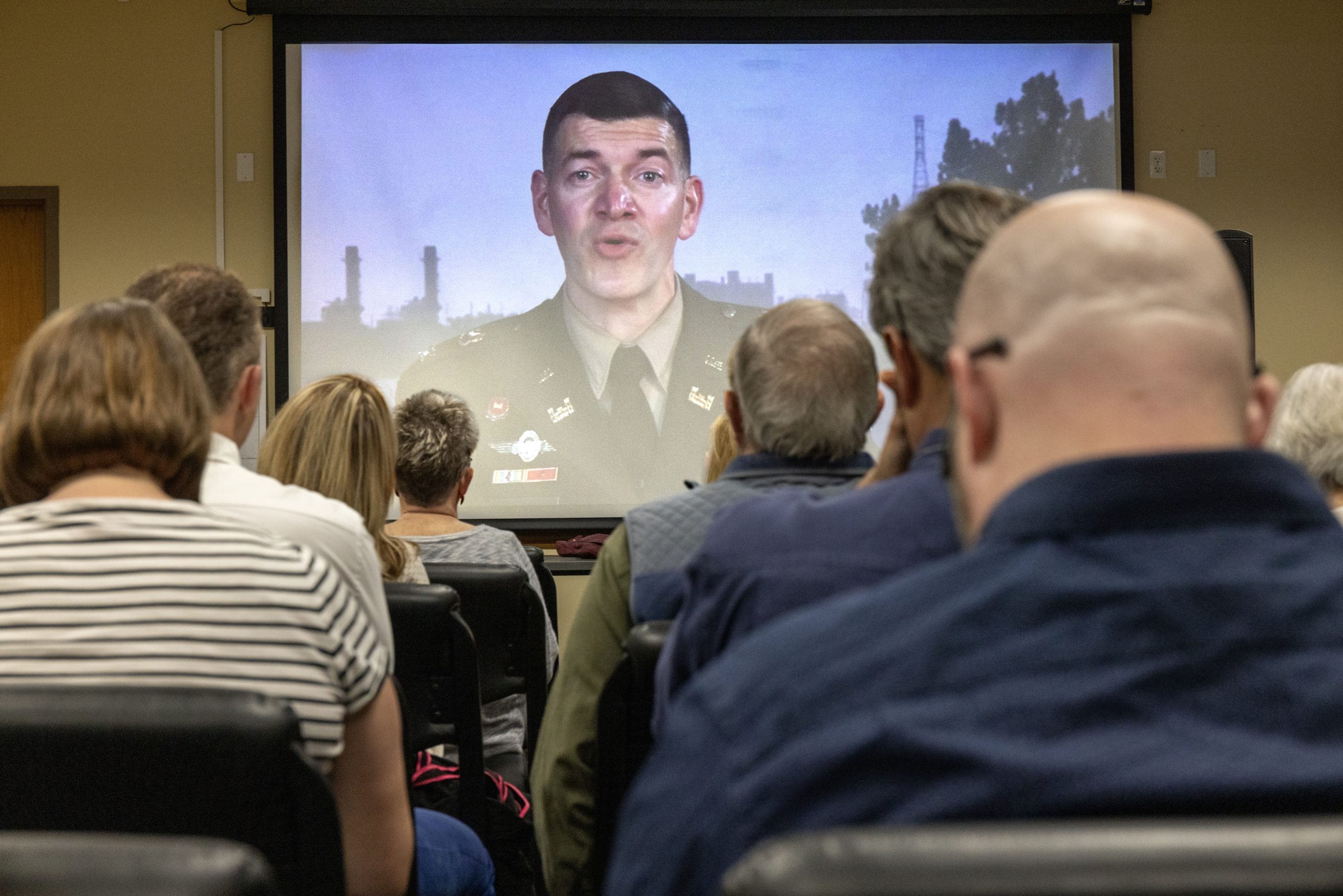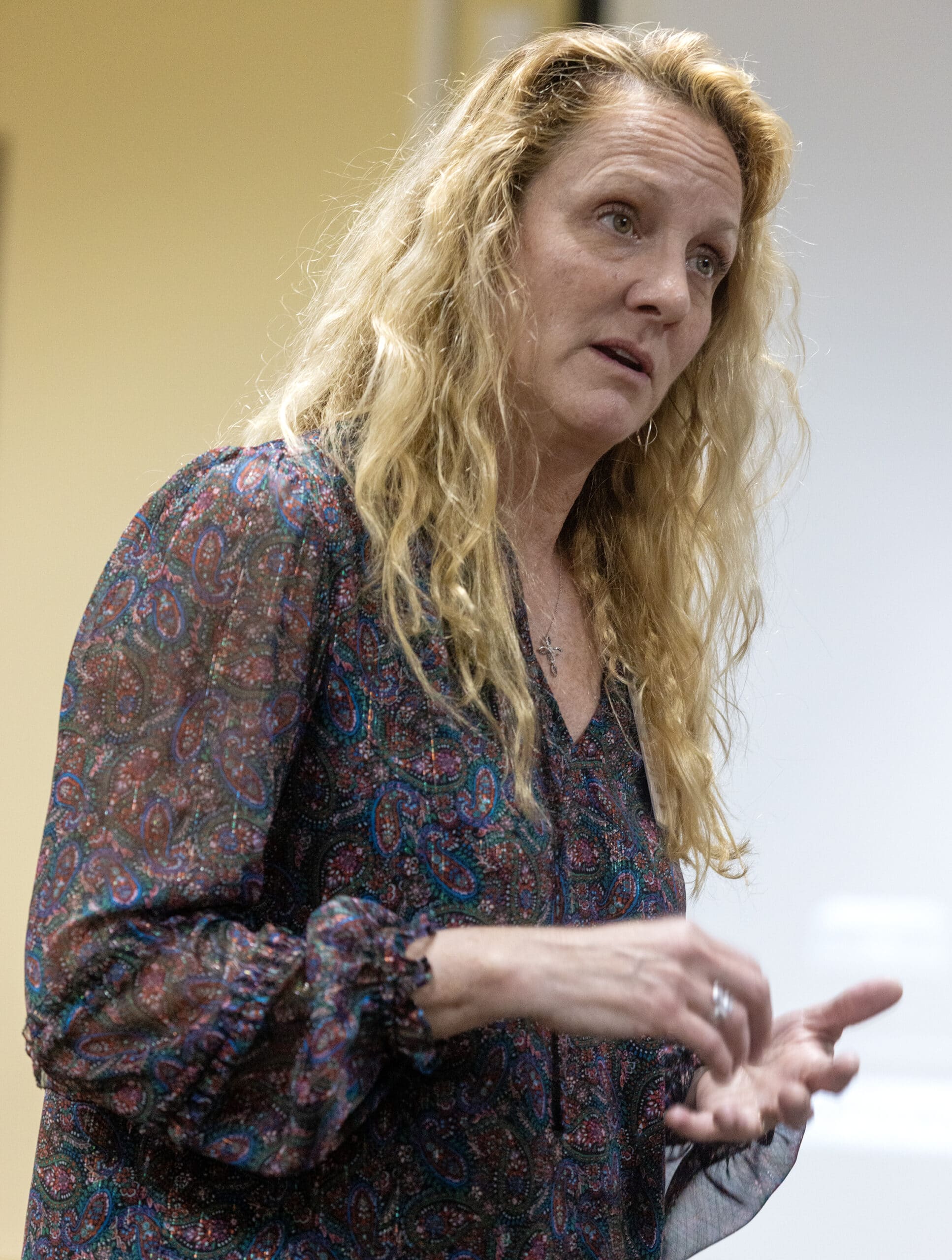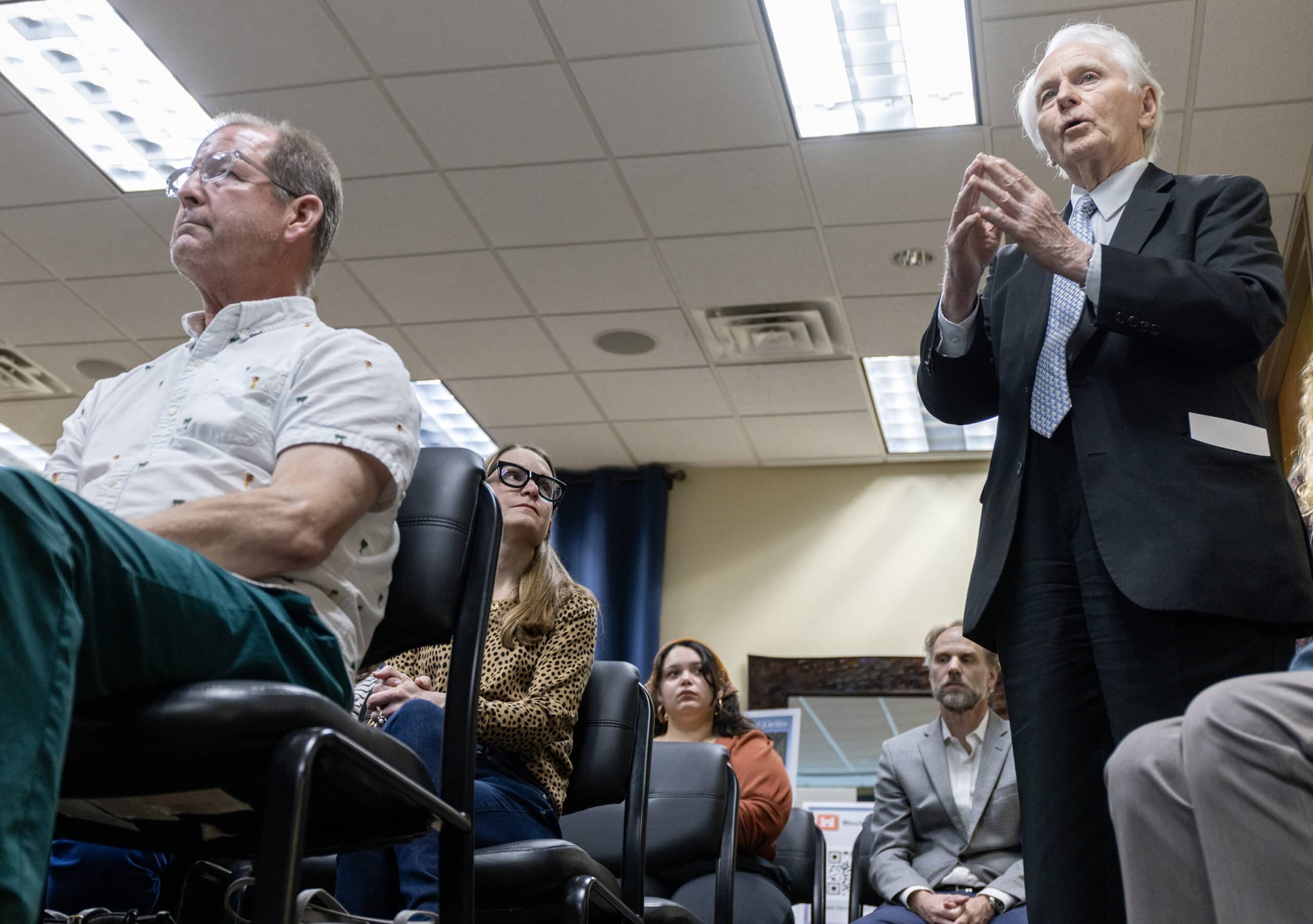Mississippi Today
Army Corps embarks on Lower Mississippi River ‘Mega Study,’ wants public input

BAY SAINT LOUIS — Mississippi Gulf Coast residents gathered at the Hancock County Library in Bay Saint Louis on Tuesday ready to voice their opposition over the use of the Bonnet Carré Spillway, which in recent years has plagued the Coast fisheries and the area's overall economy.
But the public meeting, they learned, is part of a much broader effort by the U.S. Army Corps of Engineers to reevaluate how it manages the Lower Mississippi River, which stretches from Cape Girardeau, Missouri, to the Gulf of Mexico. The meeting on Tuesday was the first in a series the corps is holding over the next two weeks.
“It's people, and it's the environment, and it's how do we balance all of our missions in this study considering the sediment and water budget in the Mississippi River, and how can we manage the overall study area in the best way possible for the next hundred years,” said Elizabeth Behrens, chief of the Environmental Studies Section for the corps' New Orleans District.
Officially titled the Lower Mississippi River Comprehensive Management Study, the venture is a result of the Water Resources Development Act of 2020, and comes with $25 million of funding.

The goal of the study, which will be a five-year effort, is to recommend specific projects around flood control, floodplain management, navigation, environmental restoration, hydropower and recreation, among other purposes.
General project ideas that the corps is already considering include: balancing water and sediment throughout the river and tributary system, reconnecting the river to its floodplain in certain areas, stabilizing channels, reducing flood risk for disadvantaged areas and changing the use of existing structure.
In the first stage of the study, the corps is traveling to cities throughout the Lower Mississippi River plain to hear what ideas residents have. Additional Mississippi meetings will take place in Stoneville on Feb. 28, Natchez on Feb. 29, and Vicksburg on March. 11 (visit the corps' study website for details on meeting details and how to submit feedback).
One of the existing structures that the corps may reevaluate is the Bonnet Carré Spillway, which the agency built in the late 1920s and early 1930s as part of the federal government's response to the Great Flood of 1927. The spillway's purpose is to divert incoming flood waters from New Orleans. When the Mississippi River reaches a certain height, the corps opens the Bonnet Carré, sending water into Lake Ponchartrain that eventually flows into the Mississippi Sound.
The corps has operated the spillway for roughly 90 years, but never as frequently as the last decade. In 2019, for the first time ever, the it opened the spillway twice in a calendar year.
The resulting influx of freshwater into the Mississippi Sound has historically disrupted the habitats of species such oysters, shrimp, crabs and even dolphins. The 2019 spillway openings devastated the populations of those species in the Sound, and subsequently local fisheries and the tourist-driven economy on the Coast as well.

Gerald Blessey, former mayor of Biloxi, said at Tuesday's meeting that the corps needs to make changes to the spillway's protocol before the end of the five-year study.
“We can expect more and more water (coming down the Mississippi River),” Blessey said. “There will be more floods. We can't wait five years to start working on solutions.”
In response to the 2019 openings, Blessey and other Coast leaders organized the Mississippi Sound Coalition to call attention to the issue. Last month, the Coalition filed a lawsuit against the corps, alleging the agency violated the Marine Mammal Protection Act by lowering the salinity and causing “direct and indirect mortality of many resident bottleneck dolphins.”
On Wednesday, a Mississippi state Senate committee passed the “Mississippi Comprehensive Coastal Conservation and Restoration Act of 2024,” a bill that would create an advisory board to work with state agencies in restoring coastal habitats.
The corps will take input on its new Mississippi River study from the public until April 2.
Behrens, the corps staffer, said the study is a historic effort in developing how the federal government manages the Mississippi River.
“This is really unprecedented,” she said. “We've been operating on the river since the (1920s), and we've been operating it off of a consistent program for a while, so this is a monumental effort. A lot of people who are no longer even living looked forward to the day that we would look again at the Mississippi River and balancing it for all these missions.”
This article first appeared on Mississippi Today and is republished here under a Creative Commons license.
Mississippi Today
The Pulse: Mississippians rally for full Medicaid expansion

Rev. Reginald Buckley joined hundreds of doctors, clergy, and Mississippians from over 35 communities at the Capitol in Jackson for a “Full Expansion Day” rally, urging legislators to expand Medicaid coverage under the federal Affordable Care Act on Tuesday, April 16, 2024.
READ MORE: ‘A matter of life and death': Hundreds rally at Capitol for full Medicaid expansion

Mississippi health news you can't get anywhere else.
This article first appeared on Mississippi Today and is republished here under a Creative Commons license.
Mississippi Today
Senate ushers in new college board appointees with few questions asked about higher education
Hearings for new members of the governing board of Mississippi's public universities last week were in a small, out-of-the-way room on the fourth floor of the Capitol that does not have live-streaming capabilities.
Senate committee meetings are usually broadcast on YouTube, a point of pride for the chamber where lawmakers occasionally mock the Mississippi House for not doing the same.
But the failure to broadcast the hearings for Gov. Tate Reeves' nominees to the Institutions of Higher Learning Board of Trustees means there is no way for students, faculty or staff who could not make it to Jackson to observe the proceedings to know what occurred, even as, according to multiple senators, the meeting was standing-room-only.
This is noteworthy because the IHL Board meetings are pro forma; the 12 trustees almost always vote in lock-step and rarely discuss policy proposals during regular open meetings in Jackson. The Senate has advise-and-consent power on the governor's nominees, so its confirmation hearings are one of the few times trustees, who serve nine-year terms, must take questions from representatives of the public.
Though Reeves' four nominees were asked by Sen. Nicole Boyd, R-Oxford, the chair of the Senate Colleges and Universities Committee, about why they wanted to serve on the IHL board, multiple senators told Mississippi Today they could not recall, or did not ask, the appointees any questions about higher education issues. The nominees were confirmed by the full Senate with no questions on Sunday afternoon.
The committee hearing occurred on April 23 at 1 p.m. in room 407, a small room tucked away in a corner of the fourth floor observation balcony, behind a scanner, a security guard, an assistant's desk and a sign that says “NO ADMITTANCE Senate Staff Only.”

“I really don't think I thought about how it didn't have live-streaming capabilities,” said Boyd, who is also a Senate conferee embroiled in the contentious Medicaid expansion negotiations. “There wasn't anything sinister about it.”
Boyd added that before the committee hearing, she and the chair of the House Colleges and Universities Committee had interviewed the four nominees. She said she was excited about the different experiences the new trustees would bring to the board.
“Our committee really wants to work closely with the college board and the community college board,” Boyd said. “I wish there were cameras in there because it's more of an intimate setting. I would like to have more meetings in there … just because the room is small and you're around the table.”
New IHL board member Jerry Griffith, a retired IRS agent who previously served on the Gaming Commission, said he was even confused if the hearing was public or private when he was contacted by Mississippi Today.
“Please forgive me, I'm not trying to be ugly or anything, but I'm so new to the board,” Griffith said. “I'm not sure if I can share anything.”
Griffith said he would be happy to chat with Mississippi Today after he made some calls, but he did not respond to further inquiries. Charlie Stephenson, the president of the Mississippi State Bulldog Club Board of Directors, and Don Clark, an attorney at Butler Snow, did not respond to Mississippi Today's requests for comment.
The final new board member, Jimmy Heidelberg, an attorney from Pascagoula, said he did not know all the committee members, but that Boyd and several other senators asked him about his education and professional experience.
“She just said we've all got your information and your background, is there anything else you want to add or ask me and I said, ‘well, it was pretty thorough,'” Heidelberg recalled, adding that he told the committee he was also concerned with Mississippi's declining population of college-aged residents.
“I said, ‘we need the best universities that we can have to keep kids home,'” he added.
Heidelberg was not asked about any policies he would support to achieve that goal, and he said he wouldn't speak on that because he is not yet familiar with the board's inner workings.
Mississippi Today asked if he supported the proposal from State Auditor Shad White to defund college degrees that don't contribute to the state's economy.
“I don't know specifically what you're talking about, but I think everybody would share if you go to college and study and achieve a degree, hopefully you will come out to be a contributing citizen with a skill that you can support yourself and your family on,” he said. “That's the point of education.”
This session, a failed effort to rename Mississippi University for Women threw a spotlight on the ailing enrollment of the state's regional colleges. Lawmakers introduced several controversial proposals to reduce the number of public universities in the state, prompting outcry, particularly from supporters of Mississippi's historically Black public universities — Jackson State University, Alcorn State University and Mississippi Valley State University.
Now, just one graduate of those three universities will sit on the IHL board after the Senate confirmed Reeves' nominees. Griffith's background report shows he graduated from Delta State University and had attended Jackson State, Boyd said.
But senators barely, if at all, asked the nominees questions about higher education, multiple sources told Mississippi Today.
“I really didn't have that many questions, and I don't remember that many questions being asked of really any of them,” said Sen. Scott DeLano, R-Biloxi.
That's not the purpose of these hearings, DeLano added. He noted Room 407 was so packed, extra chairs had to be brought in. The presidents of Mississippi State University and Delta State University were in attendance.
“Generally speaking, we don't get into that kind of stuff,” DeLano said. “It's very rare, unless it was a reappointment, but other than that, you don't want to catch somebody off guard or flat-footed on an issue they do not have … background information to understand why we're asking.”
The hearings are more about affirming the nominees' backgrounds, multiple senators said, after an investigation by the legislative watchdog. Boyd asked the nominees why they wanted to be on the IHL board.

“We got a really good sense of who they are and what they're going to bring to the college board, and I'm appreciative of people of that caliber, who could go sit and retire, giving back because the college board takes a ton of time,” Boyd said.
The last time the Senate used its power to reject an IHL appointee was in 1996 when it repeatedly turned down four of Gov. Kirk Fordice's nominees: Hassell Franklin of Houston, Ralph Simmons of Laurel, John McCarty of Jackson and Tom McNeese of Columbia. The four nominees were later confirmed in a special session.
“We want to have some general idea of where someone stands,” DeLano said, “but for the most part those boards are supposed to be independent, and they're supposed to be subject-matter experts.”
Sen. Briggs Hopson, R-Vicksburg, said he couldn't recall much of the meeting because it is the busiest time of year for him. Like other senators who spoke with Mississippi Today, he complimented the accomplishments of two of Reeves' nominees: Clark, the attorney for Butler Snow, and Heidelberg, the Pascagoula attorney, who both graduated from University of Southern Mississippi before attending the University of Mississippi School of Law.
“I don't remember exactly, and I don't know what questions were asked,” Hopson said. “I know I complemented two of the nominees that I've known … My experiences with them have always been positive.”
DeLano said that he had worked with Heidelberg on insurance policies affecting the Mississippi Gulf Coast. Boyd recalled that Clark and Griffith discussed the enrollment cliff that will uniquely affect the regional colleges.
“We've got to make sure that we're progressively and actively managing that and that we're helping our regional universities make sure that they have strong enrollment numbers and growing enrollment numbers,” Boyd said.
Ultimately, the meetings are more about jumpstarting a working relationship than they are fact-finding missions, DeLano said. After the committee wrapped, he said he spoke with Clark about public-private partnerships, because it is relevant to a bill this session that would authorize IHL to enter into a long-term lease agreement on behalf of the University of Mississippi. The bill died in conference yesterday.
“It just gives me a good opportunity to shake hands with whoever those people are and look them in the eye and tell them I look forward to working with them in my role,” DeLano said. “I've seen some committee meetings where they might get partisan on this issue. I don't care about partisanship as much as I care about their willingness to dive deep into the issues and try to understand the totality of the duties that they have.”
Sen. Sollie Norwood, D-Jackson, concurred. He said he did not ask the new trustees any questions but that he hopes to meet with them later this summer to discuss issues pertaining to the HBCUs, mainly the end of the Ayers settlement, which was meant to redress the IHL's historically underfunding of those institutions, and IHL's presidential selection process.
“I want to let them get a chance to get in and get familiar with it and then we can have those conversations,” he said.
Multiple committee members did not return inquiries from Mississippi Today or declined to comment, including: Sen. John Polk, Sen. Daniel Sparks, Sen. Josh Harkins,Sen. Alfred Butler and Sen. Tyler McCaughn.
“I am away from the Capitol and I suggest you call the committee chairwoman Senator Nicole Boyd,” Sen. Walter Michel wrote in a text.
“I wouldn't be the one to talk to,” wrote Sen. Joel Carter, also over text. “I was late due to negotiations on a conference report. I know there weren't very many questions.”
This article first appeared on Mississippi Today and is republished here under a Creative Commons license.
Mississippi Today
On this day in 1945
April 30, 1945

Sister Rosetta Tharpe, known as the “godmother of rock ‘n' roll,” made history by becoming the first gospel artist to rocket up the R&B charts with her gospel hit, “Strange Things Happening Every Day.” In so doing, she paved the way for a strange new sound.
“Rock ‘n' roll was bred between the church and the nightclubs in the soul of a queer Black woman in the 1940s named Sister Rosetta Tharpe,” National Public Radio wrote. “She was there before Elvis, Little Richard and Johnny Cash swiveled their hips and strummed their guitars. It was Tharpe, the godmother of rock ‘n' roll, who turned this burgeoning musical style into an international sensation.”
Born in Arkansas, the musical prodigy grew up in Mississippi in the Church of God in Christ, a Pentecostal denomination that welcomed all-out music and praise. By age 6, she was performing alongside her mandolin-playing mother in a traveling evangelistic troupe. By the mid-1920s, she and her mother had joined the Great Migration to Chicago, where they continued performing.
“As Tharpe grew up, she began fusing Delta blues, New Orleans jazz and gospel music into what would become her signature style,” NPR wrote.
Her hard work paid off when she joined the Cotton Club Revue in New York City. She was only 23. Before the end of 1938, she recorded gospel songs for Decca, including “Rock Me,” which became a huge hit and made her an overnight sensation. Little Richard, Aretha Franklin and Jerry Lee Lewis have all cited her as an influence.
“Sister Rosetta played guitar like the men I was listening to, only smoother, with bigger notes,” said singer-songwriter Janis Ian. “And of course, personally, any female player was a big influence on me, because there were so few.”
After hearing her successors on the radio, Tharpe was quoted as saying, “Oh, these kids and rock and roll — this is just sped up rhythm and blues. I've been doing that forever.”
On the eve of a 1973 recording session, she died of a stroke and was buried in an unmarked grave. In the decades that followed, she finally began to receive the accolades that had eluded her in life.
In 2007, she was inducted into the Blues Hall of Fame, and money was raised for her headstone. Eleven years later, she was inducted into the Rock and Rock Hall of Fame.
“She was, and is,” NPR concluded, “an unmatched artist.”
This article first appeared on Mississippi Today and is republished here under a Creative Commons license.
-
Local News5 days ago
Sister of Mississippi man who died after police pulled him from car rejects lawsuit settlement
-
Mississippi Today5 days ago
At Lake High School in Scott County, the Un-Team will never be forgotten
-
Mississippi Today2 days ago
On this day in 1951
-
Mississippi News3 days ago
One injured in Mississippi officer-involved shooting after chase
-
Mississippi News7 days ago
Viewers make allegations against Hatley teacher, school district releases statement – Home – WCBI TV
-
Mississippi News Video6 days ago
Vehicle struck and killed man lying in the road, Alcorn County sheriff says
-
Mississippi News5 days ago
Ridgeland man sentenced for molesting girl
-
Mississippi News6 days ago
Suspected Dollar General armed robber arrested in Pickens County








































